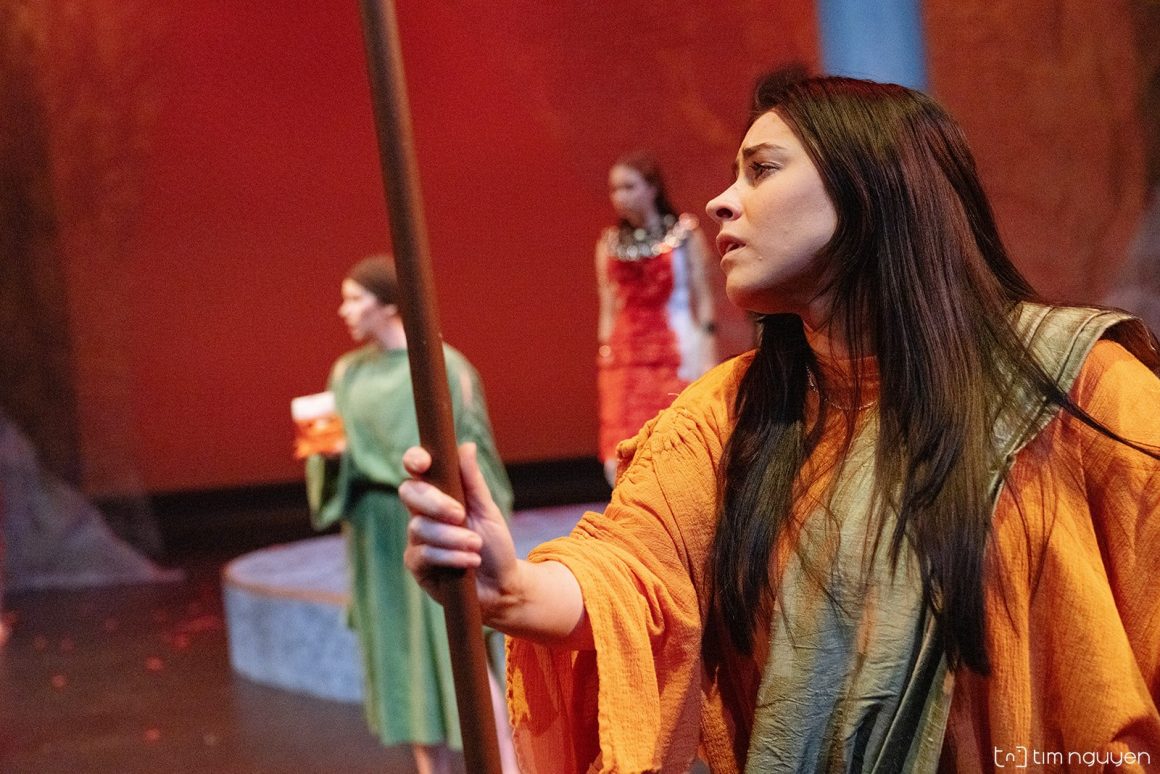
Acting, Accessibility, and Argonautika: A huge step closer to inclusivity
By Jorja Strickland, March 10 2023—
Acting is a challenging career. One that takes confidence, flexibility, a powerful presence, and eyesight — or so we have been led to believe. Yet prejudice has been holding back people with disabilities, due to the assumption that they automatically can’t accomplish what able-bodied people can. This is grossly unfair and heightens a disadvantage that is already present for many people. However, the University of Calgary is one step closer in its inclusiveness after the School of Creative and Performing Arts (SCPA) play, Argonautika, where Ashley King, a visually-impaired artist associate, is cast as Idmon — a blind seer in a story set in ancient Greece. Her passion and determination are undoubtedly inspiring, and a great opportunity to look at the ableism that is very present in the acting industry today.
King, being an artist associate at the Inside Out Theatre, is working towards making theatre more accessible. Through this role, she has become an advocate for those rarely considered in society and is taking action to help open up theatre to the disability community by creating opportunities that weren’t previously there. Although Canada has come a long way in inclusivity and accommodation, it’s fair to say that there’s still a lot to be done.
“I think so much of it really starts with society making changes,” King said when asked about advice for others to overcome the challenges brought forward with their disabilities. For example, making theatre accessible for patrons.
“How can you ever expect that person, blind or whatever that may be, to imagine themselves onstage when they can’t even be exposed to theatre?” she added.
There are so many barriers that work against people with disabilities, challenges that able-bodied people never really need to consider. The acting industry in particular is especially difficult and immediately has obstacles.
“It was never created with someone like me in mind to excel,” said King.
The acting techniques themselves are designed with the assumption that you have an able body, which excludes a huge number of people and doesn’t allow them the chance to flourish in such an environment. Typical things in acting, such as doing readings, often get taken for granted and they automatically put some actors at a disadvantage, considering visual impairment. Another key aspect of acting is the idea of “show, don’t tell” — a catchy phrase, but one that forgets about a whole group of disabled people who would understand a play a lot more if it was, in fact, described to them.
This all goes to highlight the fact that, as King notes, a huge difficulty in the drama institution is that it “can be really rigid in what’s already decided how acting is done.”
This is not just a message of awareness, but also one of hope. King mentions that society is — and should continue to progress to be — more cognizant of inclusivity and accessibility policies.
“[It is] a lot more of a safer environment than, say 10 years ago, when people weren’t as concerned about access needs, or willing to make those accommodations for people,” she said.
There’s a lot more that can be changed, or even slightly altered, to allow more space for disabled people to come into the stagelight. Moving away from the expectation of able-bodiedness, and taking time to consider — and recognize — the disadvantages others have to face, we can continue to improve accessibility and accommodation, especially considering the technology and innovations at our disposal.
“I think you can make anything accessible, you just have to be creative about it,” King said. “[It’s] more relaxing […] I can show up as myself — I get to focus on my acting.”
The cast and production team is huge, which is understandably a bit daunting. However, as an emerging actor, she liked being in a learning environment, as it establishes a really safe space for her to be welcomed into, working with informed people, both the cast and the production team.
“I really enjoyed being able to share with all the folks that I’ve met and just see how genuine they are to learn and to hear about my experiences,” said King.
Whether we’re fighting Greek monsters or prejudiced stereotypes of disabilities, King continues to be an inspiration both on and off the stage.
This article is a part of our Voices section and does not necessarily reflect the views of the Gauntlet editorial board.
